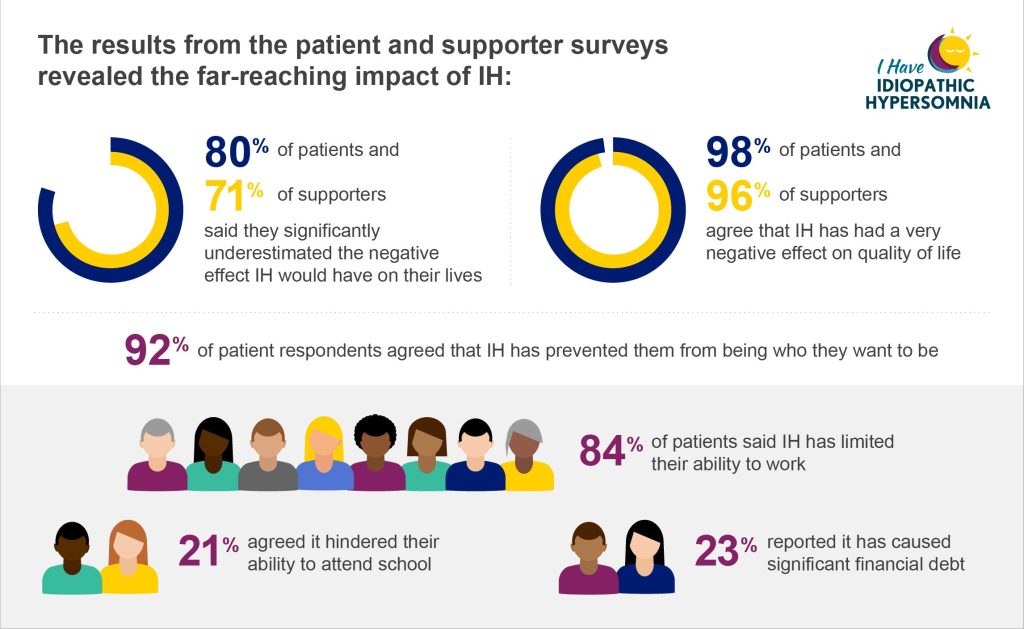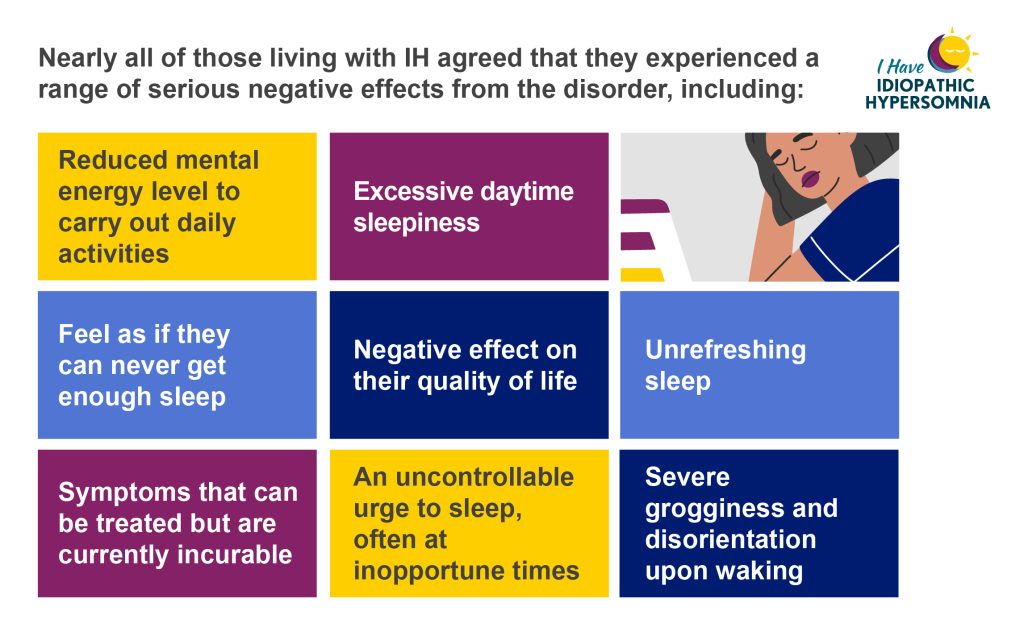Idiopathic hypersomnia (IH) is a debilitating neurologic sleep disorder characterized by chronic excessive daytime sleepiness, prolonged, non-restorative nighttime sleep, cognitive impairment and severe sleep inertia.1,2 As IH is not common or widely understood, people face challenges in managing their condition as the diagnosis is often delayed by many years.
To address the low understanding of the condition, Jazz partnered with the Hypersomnia Foundation to launch I Have IH, a disease awareness campaign aimed at increasing knowledge of IH.
As part of the campaign, Jazz and the Hypersomnia Foundation surveyed healthcare providers to measure their perceptions and knowledge of IH. Results from this survey showed that there is a low understanding of IH among physicians, underscoring the need for more education and awareness. Jazz and the Hypersomnia Foundation also sought different perspectives from the community, surveying both people living with this disorder as well as their supporters, to learn the condition’s true impact on the lives of people with IH.
This second survey, conducted between June 10 and July 2, 2021, included a nationally representative sample of patients (n=290) living with IH and supporters (n=49) caring for individuals diagnosed with IH. The patient population was comprised of 88% female and 9% male respondents, with over 50% of those surveyed between the ages of 25 and 44 years old. The race/origin of patients surveyed included White/Caucasian (88%), Bi/Multi-Racial (4%), Hispanic/Latino (2%), Black/African American (2%), Asian (1%) and Native American (1%). The supporter population was composed of 73% female and 22% male respondents, with over half of the respondents between the ages of 25 and 64. The race/origin of supporters surveyed included White/Caucasian (84%), Asian (4%), Bi/Multi-Racial (2%), Black/African American (2%), and Native American (2%).
In a previous Our Stories article, we focused on results from the patient and supporter surveys that unveiled the difficult and prolonged diagnosis journey people with IH and their supporters often endure. In this piece, we focus on additional results from the surveys that show the crippling effects IH has on day-to-day life.
Results from the patient and supporter surveys showed how IH affects patients’ family lives and makes it difficult to grow and maintain relationships. Almost two-thirds of people with IH said they constantly struggle with maintaining personal relationships (65%), with many adding that they cannot stay out late (67%) and regularly miss out on important family events because they are too tired to interact (61%). The majority of participants also strongly or somewhat agreed that IH has affected their ability to become or be a spouse, life partner or parent (68%), with a quarter choosing not to have children at all (25%).

“IH negatively affects the daily lives of people like me who are living with the disorder in ways that many do not always understand,” said Meghan M., who is living with IH. “I’m happy there is now research that reveals the true effects of IH from the patient and supporter perspectives to show just how debilitating this condition can be. Hopefully, based on these results, awareness of IH will increase and others will develop a better understanding of the challenges people with IH face.”

The constant sleepiness patients endure affects their ability to carry out basic activities and maintain a household, with nearly all patients strongly or somewhat agreeing that they struggle to stay awake long enough to do simple tasks like washing dishes and cooking (74%). Many reported regularly taking naps to try to gain function before doing routine tasks (71%), and some participants reported often becoming bedridden after performing any strenuous activity (43%). Moreover, some agreed they had to move back in with family or friends (15%) and can no longer drive due to falling asleep at the wheel (12%).
The many challenges of living with IH take a toll on mental health. Nearly three-fourths (72%) agreed that their IH itself has led to additional symptoms of anxiety and/or depression. The negative impact of IH on patients’ perception of self is further confirmed by 34% of respondents saying their symptoms have led them to have suicidal thoughts.
“At Jazz, we know all too well that people with IH face many challenges in their daily lives and that these hardships have long-lasting effects on their physical and mental wellbeing,” said Rob Iannone, M.D., M.S.C.E., executive vice president, global head of research and development of Jazz Pharmaceuticals. “Findings from the patient and supporter surveys reveal just how devastating of an impact IH can have on patients’ lives and further motivates our efforts to increase awareness and understanding of IH in partnership with the Hypersomnia Foundation.”
Jazz and the Hypersomnia Foundation are committed to bringing more awareness to IH and other serious sleep disorders and helping people with these conditions at every stage of their journey—from education and diagnosis to treatment and patient assistance.
The patient and supporter surveys were conducted online by Toluna Analytics on behalf of Jazz Pharmaceuticals and the Hypersomnia Foundation between June 15, 2021 and July 2, 2021 among a nationally representative sample of 290 people diagnosed with idiopathic hypersomnia and 49 people caring for someone diagnosed with idiopathic hypersomnia. The surveys are part of the I Have IH campaign, a partnership between Jazz Pharmaceuticals and the Hypersomnia Foundation, which aims to raise awareness of idiopathic hypersomnia within the sleep community.
The Hypersomnia Foundation engages, informs and champions our global community to improve the lives of people with idiopathic hypersomnia and related sleep disorders.
To find out more about idiopathic hypersomnia and related disorders, please visit https://www.hypersomniafoundation.org or follow us on Twitter, Instagram or Facebook.
Jazz Pharmaceuticals plc (NASDAQ: JAZZ) is a global biopharmaceutical company whose purpose is to innovate to transform the lives of patients and their families. We are dedicated to developing life-changing medicines for people with serious diseases—often with limited or no therapeutic options. We have a diverse portfolio of marketed medicines and novel product candidates, from early- to late-stage development, in neuroscience and oncology. Within these therapeutic areas, we are identifying new options for patients by actively exploring small molecules and biologics, and through innovative delivery technologies and cannabinoid science. Jazz is headquartered in Dublin, Ireland and has employees around the globe, serving patients in nearly 75 countries. For more information, please visit www.jazzpharmaceuticals.com and follow @JazzPharma on Twitter.